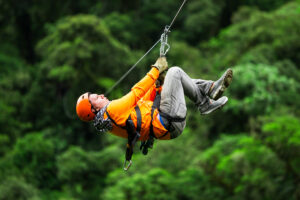 What’s made the last several months in K12 so exhausting is that we continue to try to fit a square peg into a round hole. The global pandemic has changed the shape of the peg, yet we still seem to be holding onto the “normalcy” of pre-pandemic education. Even with the opening of school in the fall approaching quickly, most of us are not yet ready to admit that schools and the learning that will go on inside them will be different…drastically different. Opening plans reflect a lot of the operational changes that will be needed, but few vision for a new normal in terms of learning.
What’s made the last several months in K12 so exhausting is that we continue to try to fit a square peg into a round hole. The global pandemic has changed the shape of the peg, yet we still seem to be holding onto the “normalcy” of pre-pandemic education. Even with the opening of school in the fall approaching quickly, most of us are not yet ready to admit that schools and the learning that will go on inside them will be different…drastically different. Opening plans reflect a lot of the operational changes that will be needed, but few vision for a new normal in terms of learning.
This past week Will Richardson and Homa Tavanger at the Big Question Institute shared a metaphor by Arundhati Roy–pandemic as portal.
Whatever it is, coronavirus has made the mighty kneel and brought the world to a halt like nothing else could. Our minds are still racing back and forth, longing for a return to “normality,” trying to stitch our future to our past and refusing to acknowledge the rupture. But the rupture exists. And in the midst of this terrible despair, it offers us a chance to rethink the doomsday machine we have built for ourselves. Nothing could be worse than a return to normality.
Historically, pandemics have forced humans to break with the past and imagine their world anew. This one is no different. It is a portal, a gateway between one world and the next.
We can choose to walk through it, dragging the carcasses of our prejudice and hatred, our avarice, our data banks and dead ideas, our dead rivers and smoky skies behind us. Or we can walk through lightly, with little luggage, ready to imagine another world. And ready to fight for it.
This moment is an interesting one….I actually feel hopeful. The image of walking through this period to “imagine another world” is exciting! How might we begin?
In the hot-off-the-press book COVID-19: The Great Reset, authors Klaus Schwab and Thierry Malleret frame the reset of the world within a framework of three characteristics that define the world today:
- Interdependence – Using a boat metaphor from Kishoore Mahbubani, we receive a powerful picture of our interconnectedness as a planet.
If we 7.5 billion people are now stuck together on a virus-infected cruise ship, does it make sense to clean and scrub only our personal cabins while ignoring the corridors and air wells outside, through which the virus travels? The answer is clearly: no. Yet, this is what we have been doing. … Since we are now in the same boat, humanity has to take care of the global boat as a whole.
- Velocity – We have been in an era of exponential growth, something that causes us cognitive dissonance and our heads to spin. We as humans are challenged to understand the exponential growth in our world, including the exponential growth of this pandemic. We can’t seem to keep up…to move fast enough.
- Complexity – Our challenges…the pandemic and rethinking education…are complex. There are many moving pieces to the systems we need to engage with in terms of problem solving; these systems are interconnected; and solutions are non-linear. Complexity manifests itself when we make a change and it impacts other systems in ways we can’t anticipate.
So how might we use this framework when thinking about complex challenge such as opening schools and rethinking what goes on inside (and outside) of them? This is a complex challenge that has no bulleted list of actions for us to follow, so let’s pose some additional questions to ponder?
- Are our schools too interconnected to other parts of our system (economy, technology, politics, etc) to fully open…to go back to normal?
- What will be the 2nd, 3rd, 4th and 5th order effects of opening schools?
- Is out thinking too siloed in education? What external signals that impact how we learn do we need to consider as we engage in plans to reopen our schools? How might we cross our own boundaries and engage the work of other disciplines to reimagine what school might look like?
- How has education resisted the velocity of the outside world? How might we actually embrace that velocity to design a preferred future for education?
What questions are you asking to help reframe the conversation on what’s next for education, specifically how we learn in schools?
Connect with Randy on Twitter, the TLTalkRadio podcast, and the Shift Your Paradigm podcast!
Get new content delivered to your inbox and the ebook 3 Key Principles of Digital Transformation. The ebook contains valuable information from my experience leading a digital transformation and working with a variety of stakeholders over the past decade.
- A silver lining - January 22, 2022
- Is our use of tech working against us? 🤔 - September 8, 2021
- What’s NOT going to change in the next 10 years? 🤔 - September 7, 2021